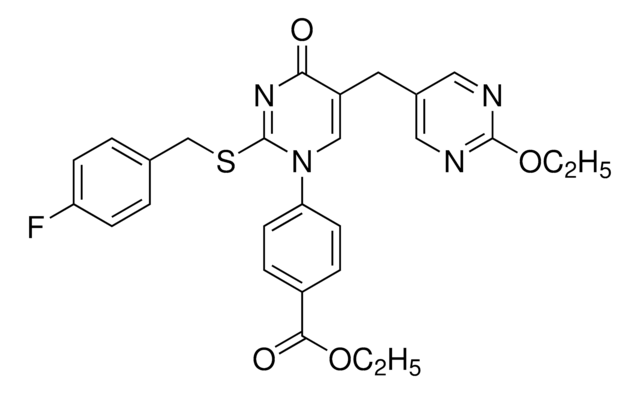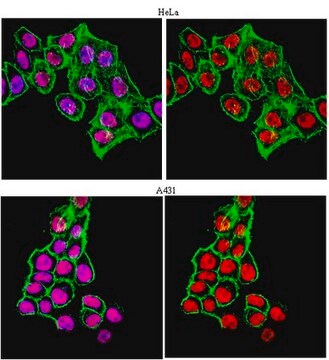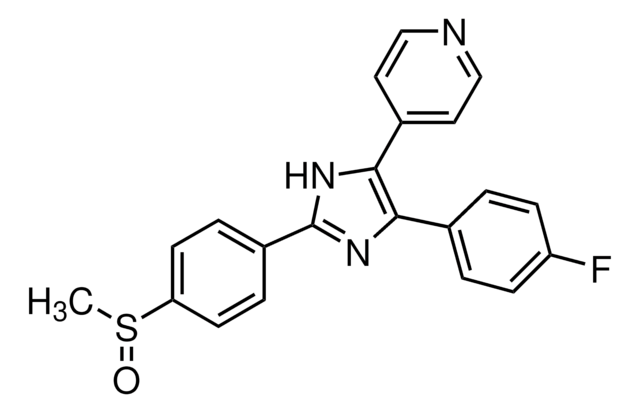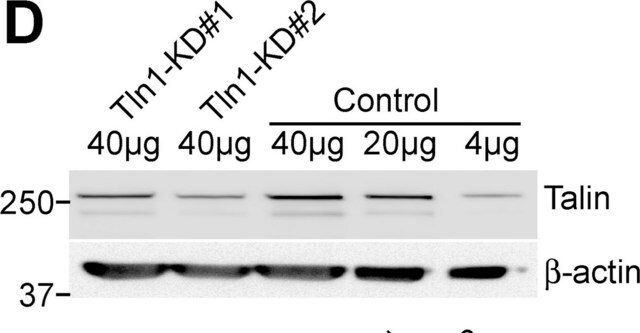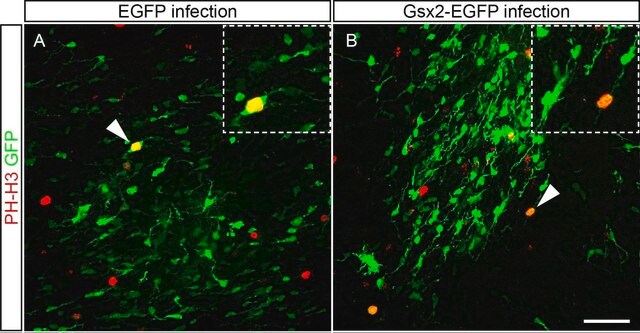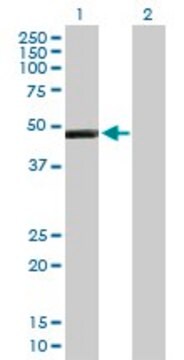05-683
Anti-Mps1 Antibody, CT, clone 4-112-3
clone 4-112-3, Upstate®, from mouse
Sign Into View Organizational & Contract Pricing
All Photos(1)
About This Item
UNSPSC Code:
12352203
eCl@ss:
32160702
NACRES:
NA.41
Recommended Products
biological source
mouse
Quality Level
antibody form
purified immunoglobulin
antibody product type
primary antibodies
clone
4-112-3, monoclonal
species reactivity
human
manufacturer/tradename
Upstate®
technique(s)
immunocytochemistry: suitable
immunoprecipitation (IP): suitable
western blot: suitable
isotype
IgG
NCBI accession no.
UniProt accession no.
shipped in
wet ice
target post-translational modification
unmodified
Gene Information
human ... C5AR2(27202)
General description
This antibody is known to inhibit the autophos-phorylation/kinase activity of Mps1; Mps1 was previously known as TTK/PYK
Specificity
Mps1
Immunogen
His-tagged fusion protein corresponding to amino acids 3-856 of human Mps1
Application
Anti-Mps1 Antibody, CT, clone 4-112-3 is a high quality Mouse Monoclonal Antibody for the detection of Mps1 & has been validated in IP, WB, ICC.
Research Category
Epigenetics & Nuclear Function
Epigenetics & Nuclear Function
Research Sub Category
Cell Cycle, DNA Replication & Repair
Cell Cycle, DNA Replication & Repair
Quality
routinely evaluated by immunoblot on HeLa total cell extract
Target description
97kDa
Physical form
0.1M Tris-glycine, pH 7.4, 0.15M NaCl, 0.05% sodium azide before the addition of glycerol to 30%
Format: Purified
Protein G Chromatography
Storage and Stability
2 years at -20°C
Legal Information
UPSTATE is a registered trademark of Merck KGaA, Darmstadt, Germany
Disclaimer
Unless otherwise stated in our catalog or other company documentation accompanying the product(s), our products are intended for research use only and are not to be used for any other purpose, which includes but is not limited to, unauthorized commercial uses, in vitro diagnostic uses, ex vivo or in vivo therapeutic uses or any type of consumption or application to humans or animals.
Not finding the right product?
Try our Product Selector Tool.
Storage Class
10 - Combustible liquids
wgk_germany
WGK 1
Certificates of Analysis (COA)
Search for Certificates of Analysis (COA) by entering the products Lot/Batch Number. Lot and Batch Numbers can be found on a product’s label following the words ‘Lot’ or ‘Batch’.
Already Own This Product?
Find documentation for the products that you have recently purchased in the Document Library.
Uday B Maachani et al.
Oncotarget, 7(33), 52912-52927 (2015-05-21)
Monopolar spindle 1 (MPS1) is an essential spindle assembly checkpoint (SAC) kinase involved in determining spindle integrity. Beyond its mitotic functions, it has been implicated in several other signaling pathways. Our earlier studies have elaborated on role of MPS1 in
Volker M Stucke et al.
The EMBO journal, 21(7), 1723-1732 (2002-04-03)
Budding yeast Mps1p kinase has been implicated in both the duplication of microtubule-organizing centers and the spindle assembly checkpoint. Here we show that hMps1, the human homolog of yeast Mps1p, is a cell cycle-regulated kinase with maximal activity during M
Jeran K Stratford et al.
PloS one, 12(4), e0174863-e0174863 (2017-04-06)
Pancreatic ductal adenocarcinoma, which accounts for the majority of pancreatic cancers, is a lethal disease with few therapeutic options. Genomic profiling of pancreatic ductal adenocarcinoma has identified a complex and heterogeneous landscape. Understanding the molecular characteristics of pancreatic ductal adenocarcinoma
M Kasim Diril et al.
PLoS genetics, 12(9), e1006310-e1006310 (2016-09-16)
The Greatwall kinase/Mastl is an essential gene that indirectly inhibits the phosphatase activity toward mitotic Cdk1 substrates. Here we show that although Mastl knockout (MastlNULL) MEFs enter mitosis, they progress through mitosis without completing cytokinesis despite the presence of misaligned
Uday Bhanu Maachani et al.
Molecular cancer research : MCR, 13(5), 852-862 (2015-02-28)
To ensure faithful chromosome segregation, cells use the spindle assembly checkpoint (SAC), which can be activated in aneuploid cancer cells. Targeting the components of SAC machinery required for the growth of aneuploid cells may offer a cancer cell-specific therapeutic approach.
Our team of scientists has experience in all areas of research including Life Science, Material Science, Chemical Synthesis, Chromatography, Analytical and many others.
Contact Technical Service